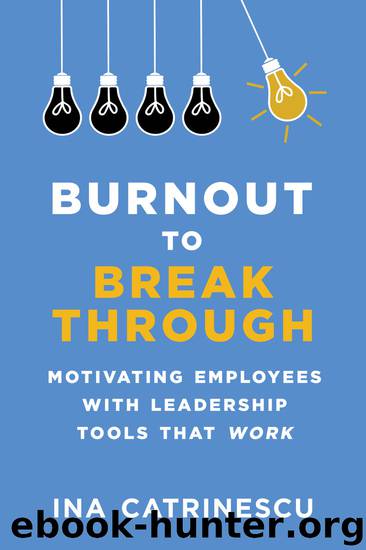Burnout to Breakthrough by Ina Catrinescu

Author:Ina Catrinescu
Language: eng
Format: epub
Publisher: Skyhorse Publishing
Published: 2018-04-14T16:00:00+00:00
5.
Employers have been generous and have done their utmost to fulfill our needs, all the while overlooking the defining principle of motivation: It’s not “quid pro quo,” but emotion that turns people on. Think about it, what does quid pro quo trigger? It puts people on the defensive, watchful to ensure that the other party is not getting more than they bargained for. It makes people vigilant and hostile, not just toward organizational goals, but toward our colleagues, too. “Why should I work harder than John, when John gets paid more?”
Coming from one of the poorest countries in Europe, I can attest first-hand to the deficiency in Maslow’s types of theories. In Moldova, and some other Eastern European countries, people will, more often than not, choose to invest in a local tradition, such as a wedding or a funeral ceremony, before their basic needs are met. They will invest generously, and mostly resources they do not have. The fact that a man is stone broke and survives on bread and kefir for the biggest part of the year will not keep him from putting together an Easter ceremony that would be considered a feast for kings even by the nouveau riche.
It’s not rocket science that it’s nice to have the hygiene factors, or, in other words, the basic needs, out of the way for us to be able to focus on the more aspirational stuff that you want us to focus on, but this is hardly the way to sustain motivation. Take food as an example. It’s true that if we’re used to eating food three times a day, once a meal is omitted, food suddenly takes a central stage in our attention, to the detriment of anything else we’ve got going on. When we’re starving we’ll have a hard time being concerned with our performance. In war zones, the need for food often makes people oblivious to danger. That’s a fact with biological reasons. Ghrelin, a hormone produced by the stomach lining which gives us the feeling of hunger, binds to cells not just in the part of the brain where we register appetite, but also in the region that plays a role in learning, memory, and spatial awareness. So when we’re hungry, we’ve got hormones messing with our productivity.
The same holds true when we’re too full. A full stomach makes us sluggish. When we eat, a variety of hormonal pathways responsible for redirecting blood flow are activated. This changes our metabolic rate and releases digesting enzymes. A complex process that draws on our energy reserves is set in motion. A full stomach, therefore, is also not optimal for productivity. The truth is that neither end of the basic-needs-fulfillment spectrum promotes productivity. Being partially hungry and partially full at the same time is usually the recommended state.
Maslow himself wrote that we are predominantly only “partially satisfied and partially unsatisfied in all our basic needs at the same time.”58 When it comes to motivation, there is no mixture of needs-fulfillment that will concoct the perfect recipe for motivation or engagement.
Download
This site does not store any files on its server. We only index and link to content provided by other sites. Please contact the content providers to delete copyright contents if any and email us, we'll remove relevant links or contents immediately.
| Ethics | Etiquette |
| Fashion & Image | Health & Stress |
| Motivation & Self-Improvement | Work Life Balance |
| Workplace Culture |
Tools of Titans by Timothy Ferriss(6938)
Change Your Questions, Change Your Life by Marilee Adams(6637)
Deep Work by Cal Newport(5452)
Man-made Catastrophes and Risk Information Concealment by Dmitry Chernov & Didier Sornette(4731)
Big Magic: Creative Living Beyond Fear by Elizabeth Gilbert(4719)
The Slight Edge by Jeff Olson(4716)
The Motivation Myth by Jeff Haden(4521)
Digital Minimalism by Cal Newport;(4512)
Stone's Rules by Roger Stone(4413)
Ego Is the Enemy by Ryan Holiday(3983)
The Laws of Human Nature by Robert Greene(3936)
Tuesdays with Morrie by Mitch Albom(3830)
Rising Strong by Brene Brown(3777)
Eat That Frog! by Brian Tracy(3509)
Skin in the Game by Nassim Nicholas Taleb(3456)
The Money Culture by Michael Lewis(3278)
Skin in the Game: Hidden Asymmetries in Daily Life by Nassim Nicholas Taleb(3259)
Believe It to Achieve It by Brian Tracy & Christina Stein(3201)
Bullshit Jobs by David Graeber(3173)
